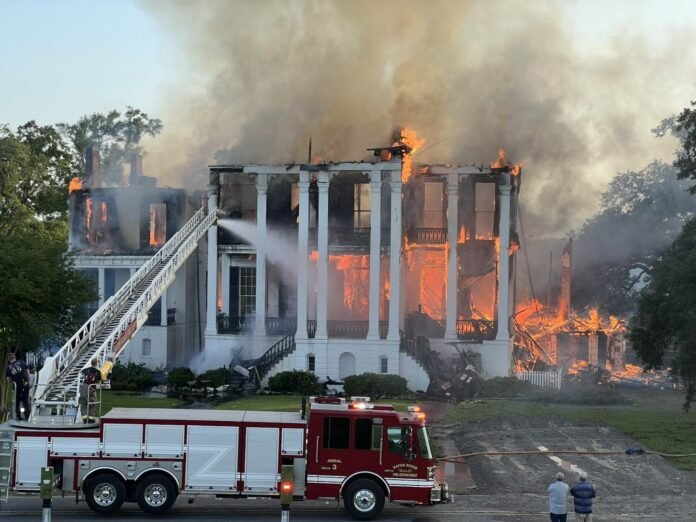One of the biggest problems facing America today is its inability to fully reckon with its past and the horrific events that have occurred within our borders. As I mentioned in my last op-ed article, this tendency permeates our political discourse and prevents us from engaging honestly on where we have been and how it may influence our future.
The recent fire at the Nottoway Plantation in Louisiana has brought this issue to the forefront. The plantation, which was built by enslaved people in the 1850s, had been a popular hotel and wedding destination.
This is not new. The spread of the “Lost Cause” mythology around the Civil War is the most prominent example of how we have attempted to whitewash our history. Anyone who has spent time in the South has heard of the “War of Northern Aggression” and that the Civil War was about “states’ rights.” In 1939, Clark Gable and Vivien Leigh starred in Gone with the Wind, a film that portrayed slaveholders as sympathetic protagonists and romanticized life on a Southern plantation.
In a cruel bit of irony, Hattie McDaniel, who became the first Black actor to win an Academy Award for her role in the film, was unable to attend the film’s premiere in Atlanta due to Georgia’s Jim Crow laws.
“Gone with the Wind” went on to become one of the most celebrated movies in American cinema. In 1998, the American Film Institute ranked it as the fourth best film ever made (it fell to sixth in 2007). When adjusted for inflation, it is still the highest-grossing film of all time. It is perhaps the most prominent example of how mainstream society has ignored the horrors of slavery and failed to hold its perpetrators accountable in the historical record.
Today, there are still those actively working to suppress these stories. In 2022, my wife and I visited James Madison’s Montpelier in Virginia. As we left, we were approached by a Fox News reporter and camera crew. I agreed to speak about the tour we had taken.
The reporter appeared particularly concerned with the tour’s mentions of slavery, despite the well-documented fact that enslaved people lived and died on Madison’s estate. Talking about their lives is not “political correctness,” it is a necessary part of honoring their humanity and understanding the foundations of American history. Yet when Fox News aired my comments, they were placed within a segment alleging that “wokeness” is “destroying” American education.
Rural people and communities still live with the scars of these injustices. If you look at a map of poverty rates in this country, those scars are illuminated. As noted by the United States Department of Agriculture in 2021, Black and Indigenous Americans are more likely to reside in a high or persistent poverty county than any other group. They are also more likely to face adverse health outcomes and have lower life expectancy.
Plantation weddings are an outgrowth of the same denial that has driven Gone with the Wind’s popularity for almost 90 years. Most notably, Blake Lively and Ryan Reynolds were married in October 2012 at Boone Hall Plantation in Mt. Pleasant, South Carolina. In 2020, Reynolds apologized for this decision. But his decision to get married there is emblematic of the broader systemic denial of the horrors of its past.
And this phenomenon is not just limited to the South. It can also be observed in California, where people also get married at the Spanish Missions where Indigenous Californians were held, forced to work, and forcibly converted to the Catholic faith. In 2019, California Governor Gavin Newsom referred to the treatment of Indigenous Californians as genocide and apologized for the actions of his predecessors.
These structures have an important role in society, as places of education and remembrance. They are reminders of the depravity that has existed within our borders. They are memorials to those who lived and died within their walls. Repurposing these sites is an opportunity to tell a fuller story, one grounded in truth, not myth.
We do not have the luxury of ignoring the past because it impacts our present and future. The American tendency to ignore or deny the brutality within our borders is an active barrier to addressing the historical harms that have been created.
If we cannot face our past with honesty, we will never shape a future grounded in justice.
Christopher Chavis grew up in rural Robeson County, North Carolina, and is a frequent writer and speaker on baseball history and rural access-to-justice issues. He is a citizen of the Lumbee Tribe of North Carolina.






